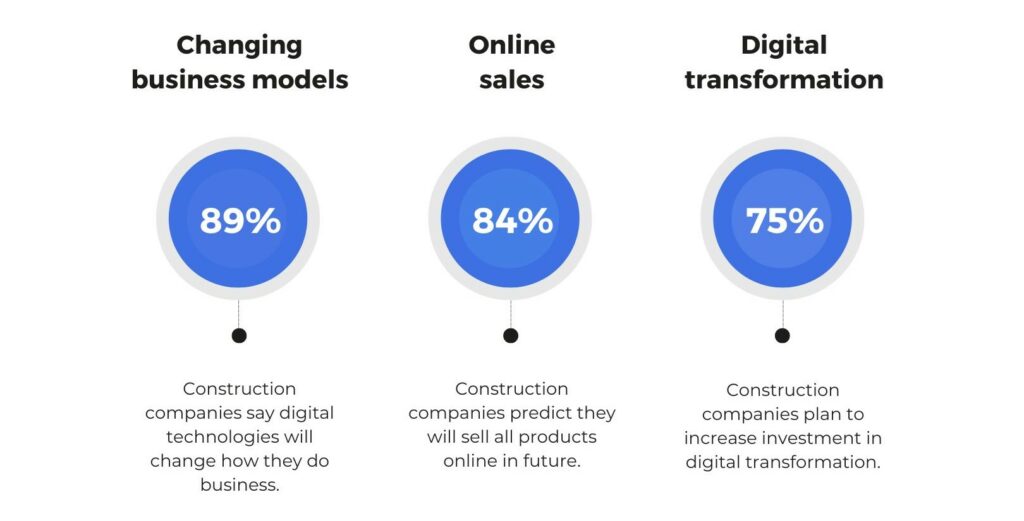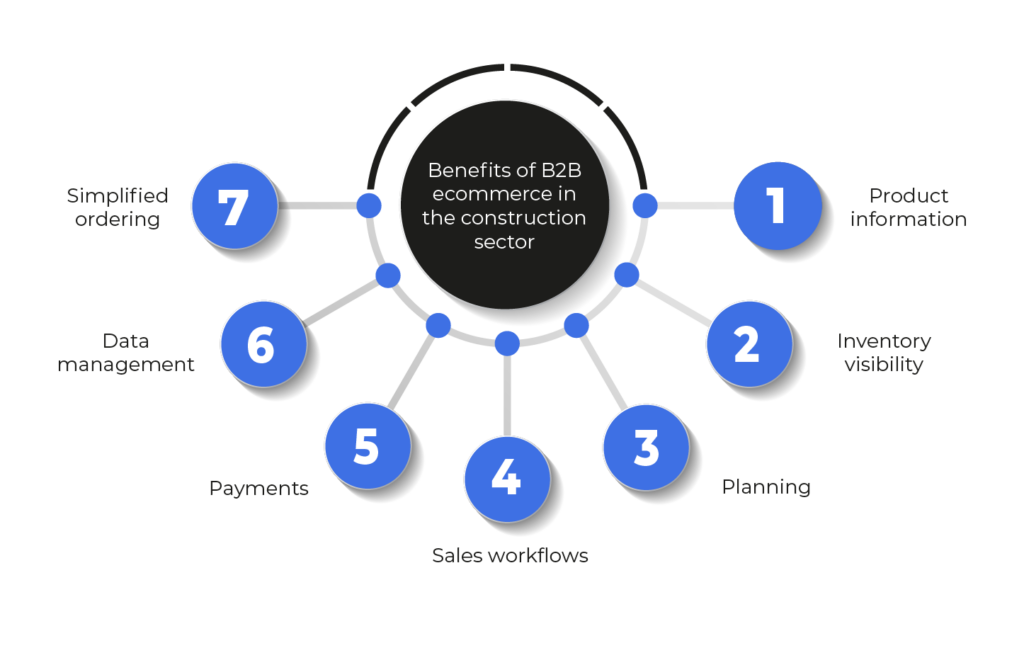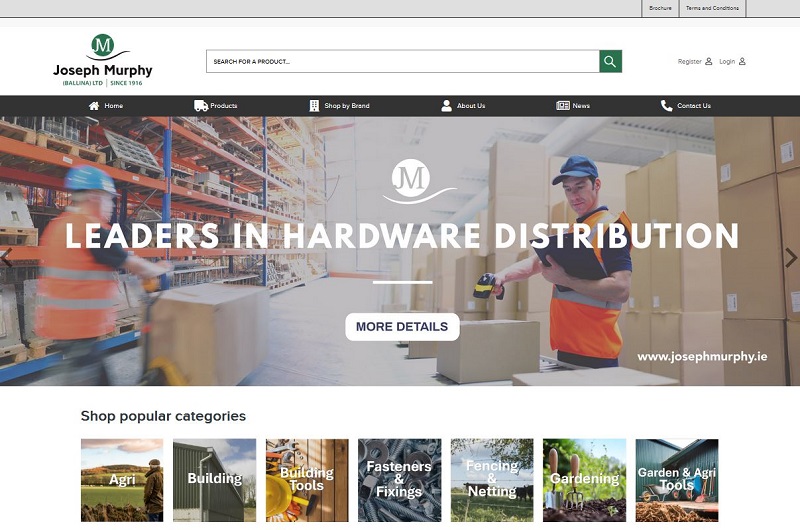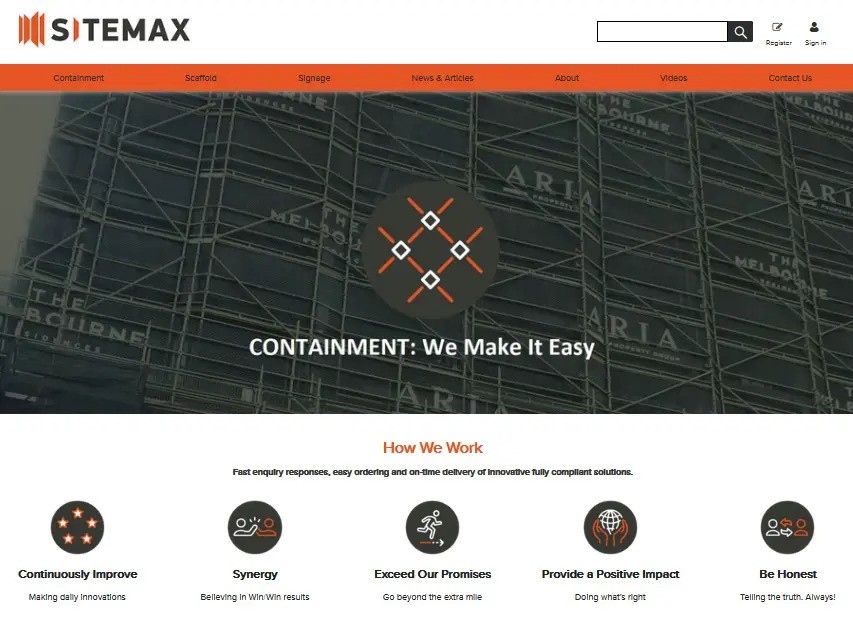A recent report released collaboratively by the B2B eCommerce Association found construction materials buyers make multiple purchases every week. Some are placing orders every day on the same business to business (B2B) ecommerce websites. Features such as easy repeat ordering and one-click checkouts are priorities for good user experiences.
The biggest challenges are poor user experiences, lack of real-time product availability information and no provision for payment terms. Seven out of 10 respondents in the sector said they would abandon an ecommerce purchase if payment terms weren’t offered at checkout. Overall, these factors mean many construction and building materials buyers abandon their online purchases. You could be losing valuable orders every day as they move to more tech-friendly suppliers.
Manually handling construction orders and invoices is detailed and time consuming. You can empower your buyers with Cloudfy, providing online self-service tools to simplify and streamline complex and repeat ordering.
Pre-built integrations with leading enterprise (ERP) systems allow you to synchronize key business data. Your customers can see your inventory availability and their own custom pricing.
Cloudfy is a software as a service (SaaS) B2B ecommerce solution purpose designed for complex sales. Available on a monthly subscription basis you don’t need to invest your capital in IT infrastructure. Hosting, maintenance, security and upgrades are all done for you in the cloud. It’s scalable too, so you can handle peak demand easily and it can grow with your business. The helpful team at Cloudfy is always on hand for advice and support.
With a field sales representative app and customer ordering app included, it’s easy to place orders anywhere at any time.
Table of Contents

Digital transformation in the construction industry
The majority of businesses in the construction sector recognize the growing importance of digitization.
However, many still fail to meet their customers’ expectations by implementing digital transformation and moving to online sales. The most common challenges are identifying opportunities for digitization and the potential benefits. Additionally, integration of digital tools with business processes is currently poor.
Over seven out of 10 companies in the construction sector agree they are struggling to implement digitization. This is despite widespread understanding it could revolutionize project management from beginning to end.
Some companies have already or are planning to move into ecommerce. However, few have met the challenge of creating the user experiences their buyers want. Time and convenience are priorities for buyers who must meet demanding project deadlines and budgets. Usability of B2B ecommerce sites, lack of accurate data and complex reordering and checkout processes are common problems. Top of the list of requirements are delivery tracking and bespoke payment terms.

The case for B2B ecommerce in the construction sector
A survey in 2020 found that over 70% of companies said they were prioritizing changes to their processes, business models or ecosystems. However, only 13% said they were making good progress to deliver digital journeys for their customers.
Construction projects involve multiple independent subcontractors and suppliers and changes to requirements and specifications are normal. Alongside the practical constraints, ongoing supply chain disruptions, scheduling and even the weather all have an impact.
Technology can drive change in the sector based on a clear understanding of the benefits and challenges involved. However, despite regularly overrunning schedules and budgets, construction productivity has only improved around 1% in the last 20 years.
Increasing operational costs and political and economic uncertainties affecting construction projects make improved efficiency more important than ever.

The benefits of B2B ecommerce in the construction sector
Product information
Your buyers want to find the products they need as quickly as possible. With an effective B2B ecommerce solution you can provide personalized views of your product ranges for different customers. They’ll see only the prices, promotions, payment plans and delivery methods relevant to them.
Inventory visibility
As your buyers struggle with supply chain challenges it’s more important than ever to provide the most accurate view of your stock counts. With near real time inventory information from your ERP, they can cost effectively plan procurement for their construction projects.
Planning
Forecasting is key for successful construction projects. Capturing data about buyer behavior in real time, combined with predictive analytics can help identify patterns and trends in demand. You can improve risk management and measure performance. Tracking cash flow, margins, billing, and inventory is simplified, helping you make accurate cost projections.
Sales
SAP Business One is designed to meet the sales needs of small and medium-sized businesses. You can track, monitor, and report on a range of sales order management tasks and processes. These include quotations, sales order processing, invoice management and sales reporting.
Sales workflows
You can optimize sales and purchasing processes by making it easier for your buyers to order online. With business systems integration you can track orders all the way to fulfilment. You can also use quote workflows to capture order details, produce accurate quotes and provide easy approval processes. Registered customers can track their consignments too, reducing enquiries and increasing satisfaction.
Payments
The whole e-procurement process is simplified through integration with leading business systems and third-party payment gateways. Electronic data interchange (EDI) and PunchOut ordering allow you to become part of your customers’ procurement solution. Your customers can access all their account details, agreed payment terms and balances and pay invoices at any time.
Data management
Construction companies have historically relied on paper-based processes. However, when your sales records are digital you reduce storage, simplify project management and collaboration, and save time and money. You can also create automated workflows to reduce manual data entry and increase accuracy. Everyone can see a single source of information for each order.
Simplified ordering
Smartphones and laser scanners are common on modern construction sites. Scanning barcodes or stockkeeping unit (SKU) references on site can simplify reordering. Laser tools can provide detailed measurements to improve the accuracy of online orders. Radio frequency identification (RFID) technology can track items as their used to automate replenishment orders. Even tools and equipment can store and automate spare parts ordering based on use.
Case Studies: B2B ecommerce success in the construction sector
Joseph Murphy is a family run wholesale hardware distribution company established in Ireland for over 100 years. The company worked with Cloudfy to create a brand directory. They also have a traffic-light-style inventory indicator system and can provide automatic back-in-stock notifications. Their self-service customer portal makes it easy to view and download invoices at any time.


Sitemax provides safety equipment to the construction sector in Australia. The company wanted to improve their customers’ ordering process by replacing hard copy catalogs with a B2B ecommerce approach. Their new Cloudfy site allows their customers to view their full product range online. Cloudfy pulls in customer records, product details, and inventory quantities from their ERP and returns order details for fulfillment. It’s easy to add pages, blog articles, testimonials, case studies, product videos and downloadable product data.
US-based Corpac Steel distributes pipe and steel products regionally and globally. At any time, it has 100,000 tons of inventory stocked and ready to transport. The company needed a quick and efficient way for customers to access the specifications of their products. Their new Cloudfy customer self-service portal provides mill test reports automatically, allowing customers to search, view and download product data. Customers can also access and pay their invoices at anytime.


Ecommerce for the construction industry with Cloudfy
The world of construction is changing, and materials and equipment sales are changing with it. If you want to stay ahead in this competitive market, it’s essential to embrace digital transformation.
You can put your customers’ needs first when you provide an end to end ecommerce portal with Cloudfy. You’ll deliver transparency about pricing and inventory and personalized experiences to improve customer satisfaction.
You can also future proof your business growth by taking advantage of cross selling and up selling opportunities. Over time you can collect valuable data to improve your understanding of customer needs and behavior.
Overall, the advantages and efficiencies of B2B ecommerce make it a requirement for competitive business operations in the construction sector.
Find out how Cloudfy can be part of the digital transformation of your construction materials company. Book a free demonstration today.
Frequently Asked Questions
Yes, as in many other sectors, the construction industry discovered how ecommerce could solve many pressing challenges during the pandemic. Ways of working changed and the trend continues. Your B2B buyers expect to research your products, obtain quotes and place orders online. They want contract pricing and order tracking at the touch of a button. If you don’t provide these things they are likely to look elsewhere for their suppliers.
There’s evidence that even those companies in the construction sector that have started their B2B ecommerce journeys aren’t meeting buyer expectations. Importantly there are also increasing opportunities for process improvements and cost savings through business system integration. You can make your B2B ecommerce site part of the overall digital transformation of your business. Then you can simplify processes, save money and scale more easily as your business grows.
Your buyers expectations are influenced by the challenges of their roles and their experiences of online shopping. They know it’s possible to discover products online quickly and easily and to place orders simply. They have everyday experience of seeing up to the minute information about stock levels and order status. They want the same for their work-related purchases too. They want easy user journeys around your website and accurate information about stock availability. Their main frustrations are complex reordering and difficult checkout processes.






